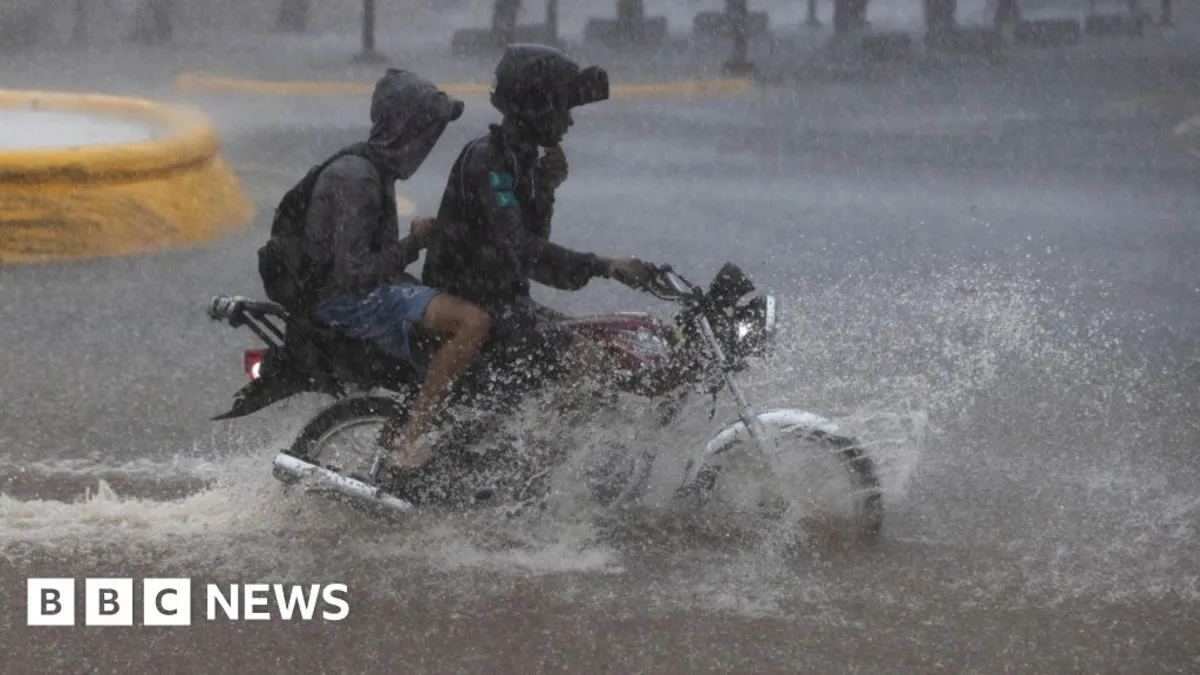
Hurricane Melissa is forecast to escalate into a rare Category Five storm as it charts its course towards Jamaica, posing serious threats of life-threatening flash flooding and devastating landslides. As of 06:00 GMT, the cyclone boasted winds reaching up to 120 mph (195 km/h) and is currently moving north-west across the Caribbean. The US National Hurricane Center (NHC) predicts that this formidable storm is likely to make landfall by Tuesday.
The NHC has issued dire warnings regarding potential power outages and significant damage to infrastructure. Hurricane Melissa is expected to unleash up to 30 inches (76 cm) of rain, coupled with dangerous sea level surges that could rise as high as 13 feet (4 meters) above ground. Residents have been urged to seek shelter immediately to ensure their safety.
As the 13th hurricane of this year's Atlantic hurricane season, which typically concludes in November, Hurricane Melissa is particularly noteworthy. A Category Five hurricane is classified as the strongest type, featuring winds of at least 157 mph. Although the NHC forecasts that Melissa may weaken to a Category Four hurricane before it makes landfall in Jamaica, they emphasize that the overall impacts will remain severe. The storm is expected to maintain at least that intensity upon hitting the island.
Residents in Jamaica are facing tropical storm-strength winds and heavy rainfall even before the storm directly affects the region. The capital city, Kingston, is expected to experience significant weather conditions early, prompting urgent calls for residents to finalize their preparations quickly. The meteorological agency has warned of a multi-day period of destructive winds and intense rain, leading to catastrophic and life-threatening flash flooding and numerous landslides.
Jamaican Prime Minister Andrew Holness addressed the nation, acknowledging the anxiety many Jamaicans feel regarding the storm. He stated, "I know that there are many Jamaicans who are anxious, who are very concerned, and rightfully so: you should be concerned. But the best way to address anxiety and any nervousness and concern is to be prepared." Residents are advised to secure their homes using sandbags and wooden boards and to ensure they have a stockpile of essential supplies.
Warnings related to Hurricane Melissa also extend to parts of Haiti, including the capital, Port-au-Prince, as well as the Dominican Republic and eastern Cuba. These areas can expect similar weather effects by the middle of next week. Tragically, landslides triggered by the hurricane have already resulted in two fatalities in Haiti, as reported by the nation's Civil Protection agency.
Hurricane Melissa is anticipated to pass over Cuba by Wednesday, although by that time, it is expected to have weakened to a Category Three storm. While it remains challenging to directly link specific weather events to climate change, scientists agree that climate change is contributing to the increased frequency and severity of weather phenomena. Warmer ocean temperatures lead to greater moisture in the atmosphere, which fuels the formation of hurricanes.
As the Atlantic hurricane season progresses, the US National Oceanic and Atmospheric Administration has predicted above-normal activity, attributing this to warmer seas and the potential for stronger monsoon activity around West Africa, where many Atlantic storms originate.